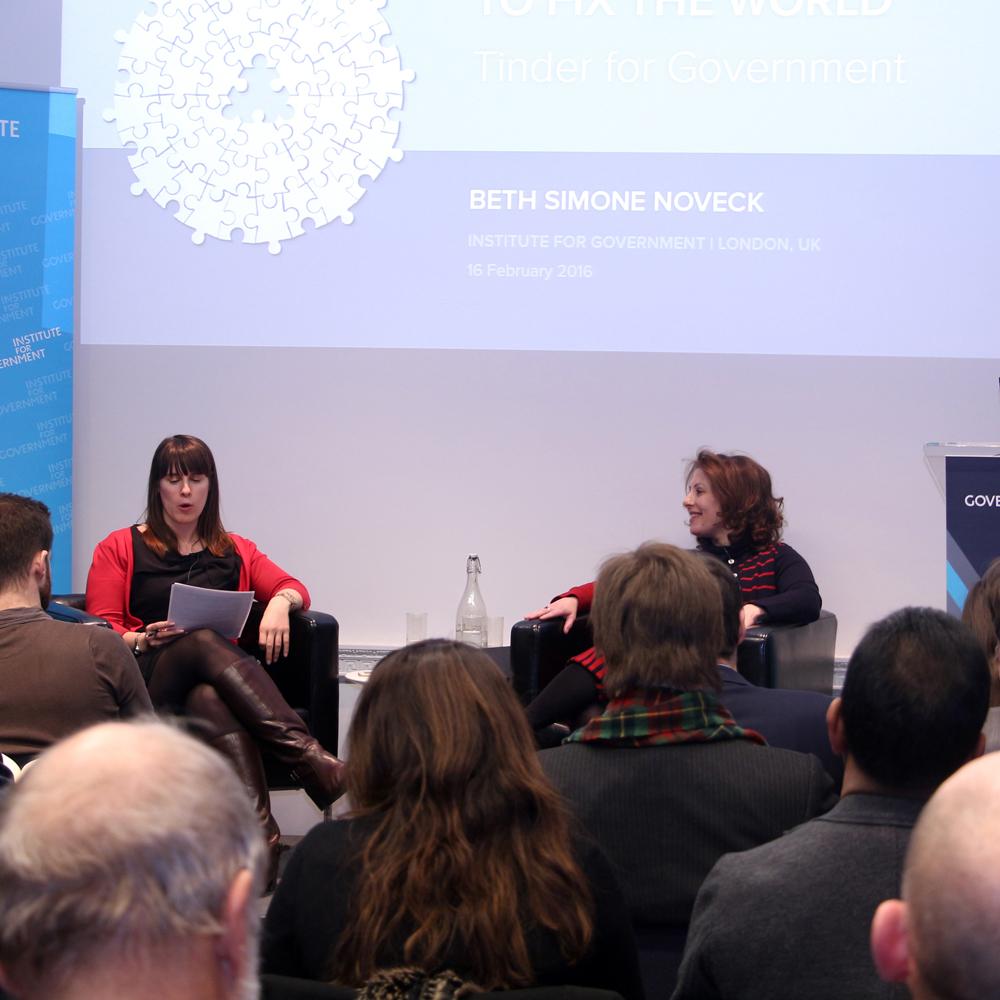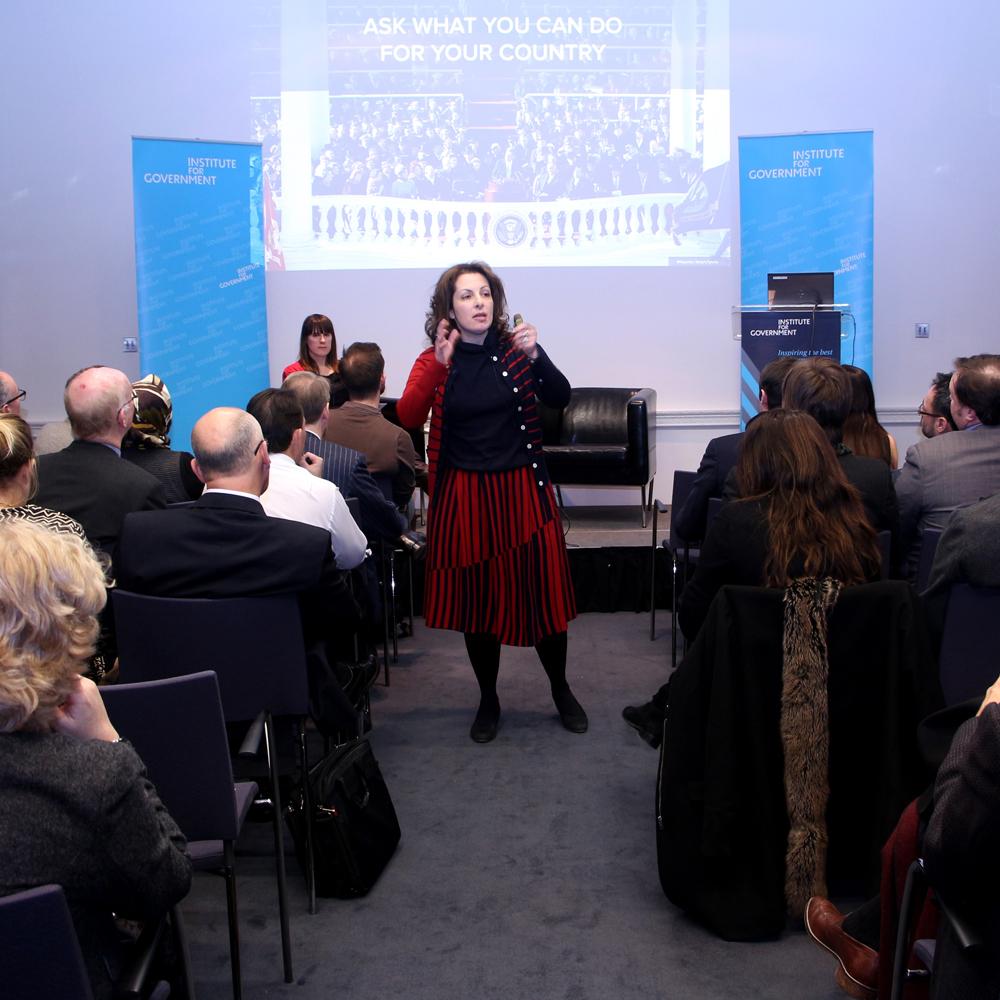Professor Beth Simone Noveck spoke at the Institute for Government about her new book, Smart Citizens, Smarter State: The Technologies of Expertise and the Future of Governing. Gavin Freeguard reports.
Government needs to be better at ‘dating’ its citizens and match demand to supply like Tinder, according to Professor Beth Simone Noveck. But rather than being a match of the romantic variety – the dating app’s speciality – this is about matching citizen expertise to the challenges government faces.
Noveck – the Director of the Governance Lab (The GovLab) in the US, and America’s first Deputy Chief Technology Officer (2009–2011) – called her presentation ‘Swipe Right to Fix the World’ after the movement Tinder users make on their smartphones to signal they ‘like’ someone, which could lead to a match.
Noveck began at the beginning of the Obama administration, with the President’s memorandum on transparency and open government that said government should be transparent, participatory and collaborative. While the US – and UK – had been successful on the transparency side, less had happened with participation and collaboration; there was a need to move from data.gov to ‘people.gov’ and crowdsource the collective intelligence of the public. There have been efforts around ‘opinion-based engagement’, like the petitions sites in the UK and in the US (where deporting Justin Bieber and building a Death Star were the most popular). But government should move beyond asking how people feel and ask what they can do and what they know, and from opinion based engagement to:
- Task- and time-based engagement – Sao Paulo’s participation efforts have included citizens teaching civil servants how to use technology.
- Idea-based engagement – Madrid and Paris are among those cities asking citizens for ideas.
- Know-how-based engagement – Peer to Patent enables the public to supply information on patent claims; Challenge.gov provides a hub for federal competitions on everything from producing more food with less water to narrowing the gap in the number of words children from low- and high-income families are exposed to.
This brings a number of challenges. A lot of time needs to be spent getting people to enter or participate. Government needs to be comfortable admitting ‘we do not know and we need help’, and comfortable with it being part of the culture (as with the developer community on Stack Exchange). There may be good historical reasons why federal advisory committees have developed, and why there might be 11 people advising on higher education funding (for example), but it’s a very different experience from Stack Exchange where a much wider range of expert contributors can get involved.
For Noveck, the key is for government to move from crowdsourcing widely to crowdsourcing wisely; ‘Imagine if we could get advice from emergency response experts and those affected by previous disasters in the event of a pandemic, find and reach out to cyber-security experts following an infrastructure attack’. Central to this is ‘people analytics’ – a form of audience segmentation allowing the right expertise to be found.
How we think about expertise also needs to change. The professionalisation of public administration meant officials were seen to have a monopoly on competence; ‘expert’ has been conflated with ‘professional’, and citizens have become separated from expertise. The internet is forcing us to change how we define, report, search and measure expertise, and Noveck considered how governments could (and have accessed) it under four headings:
- Credentials of civil servants – before it closed, the US Department of Defense’s Aristotle system acted as a social network containing the job history and qualifications of employees; the Pentagon is now rolling out a new Office of People Analytics. The Department of Health and Human Services has also created an expert network around reviewing medical devices.
- Experience of civil servants – civil servants have other skills not reflected in their job titles that can be used. The World Bank’s SkillFinder tracks such expertise; New York City’s Volunteer Language Bank logs bilingual city employees to help agencies.
- Credentials of citizens – AgriVIVO ‘facilitate[s] connections between all actors in the agricultural field’, bridging separate communities. Noveck also proposed a 21st century version of Franklin D Roosevelt’s ‘Brains Trust’: creating an expert network, starting with universities.
- Experience of citizens – initiatives accessing citizen experience include PulsePoint and GoodSAM, which alert people with medical training to nearby emergencies.
To make this happen, the new civil servant ‘will need to know how to work and talk and decide with citizens, rather than for them’ and ‘develop the skillset for managing the conversation to get at the intelligence necessary to govern in a complex society’. Fundamentally, though, this isn’t just about changing how government makes decisions, but about transforming the conception of citizenship – from ‘voting the bums out of office’ every few years to active participation, ending the false dichotomy between technocracy and legitimate citizen engagement.
A number of audience members – and Noveck herself – provided and answered some challenges to this potentially smarter world. For example:
- The agenda is profoundly challenging, even scary, to the Civil Service. Noveck remarked that we hear that ‘change is scary’ everywhere. When engagement involves people yelling at you, there is no incentive to do more of it, but co-creation models can help.
- Crowdsourcing wisely could narrow the field of people involved. Noveck accepted there is a risk of turning to a rolodex filled with the usual suspects, but we shouldn’t get rid of the open call for participation; more diversity would be a start and the perfect should not be the enemy of the good.
- There could still be a gap between central and local government. Noveck’s response was that there would be a real opportunity to involve frontline expertise at all levels of government.
- The importance of political will, including opposition policymaking, is missing from her vision. Noveck replied that politics is a bloodsport/entertainment; her work starts the day after an election.
Lessons for the UK
When asked for lessons for the UK – especially in the context of the Prime Minister’s smarter state speech – Noveck replied that to solve big challenges (such as Europe and climate change), a focus on how the machinery of government works matters. The Civil Service has already innovated. The Government Digital Service (GDS) served as an inspiration to 18F, the American equivalent. The Behavioural Insights Team and What Works are part of a culture of experimentation. On civil service reform, data and trying to do better with fewer resources, there was already pressure for innovation. Paul Maltby, Head of Data at GDS, pointed to successful collaborative examples such as Casserole Club and Dementia Friends, and described engaging citizen expertise as the next profound agenda for government. He said there were already glimmers of change within certain government communities, notably GovCamp and ODCamp, but currently no equivalent in policy. Noveck was optimistic that these co-creation models could move out of the ‘tech space’ into other parts of government. Many of those at the event left filled with similar optimism.
- Topic
- Policy making

